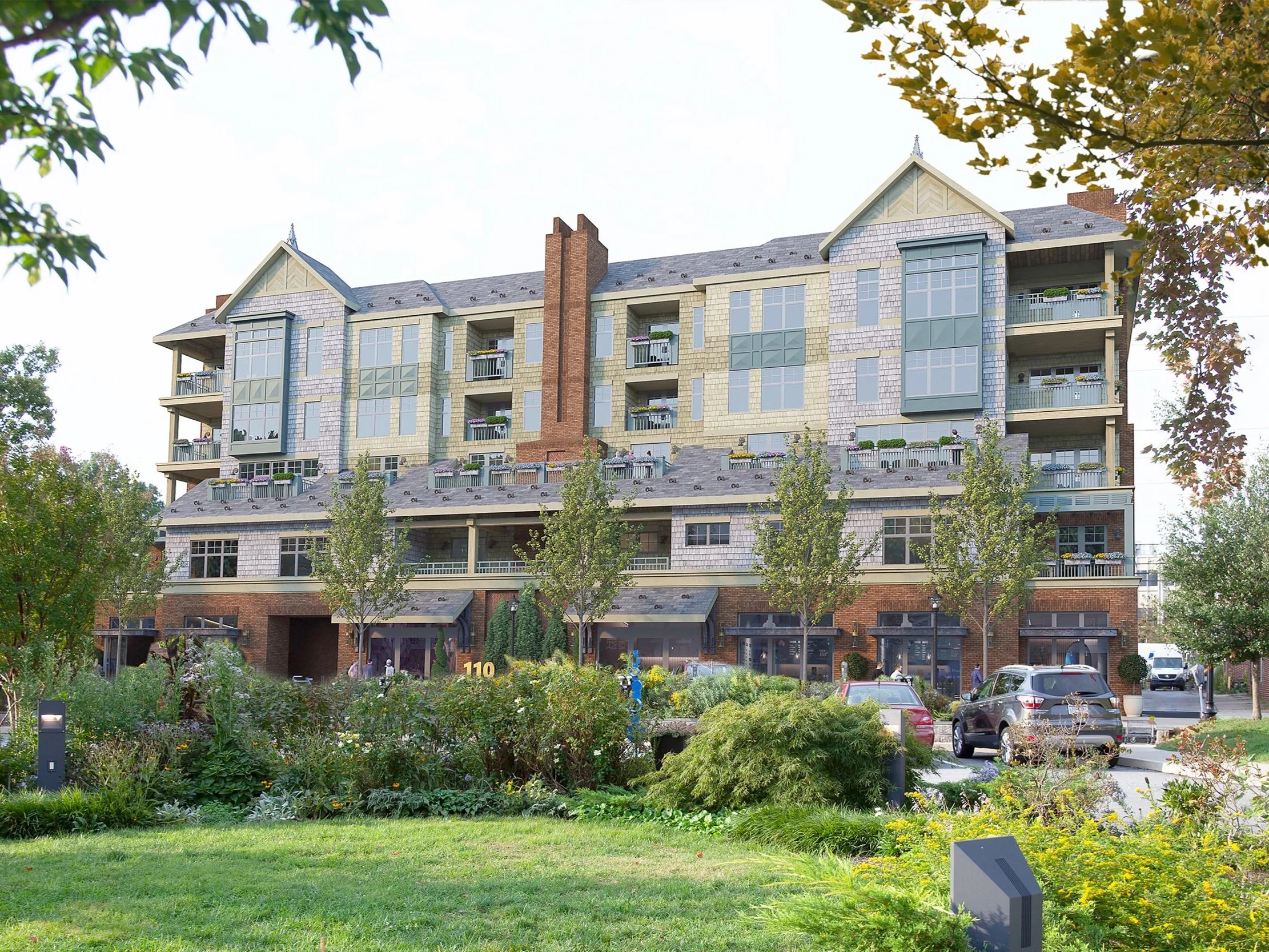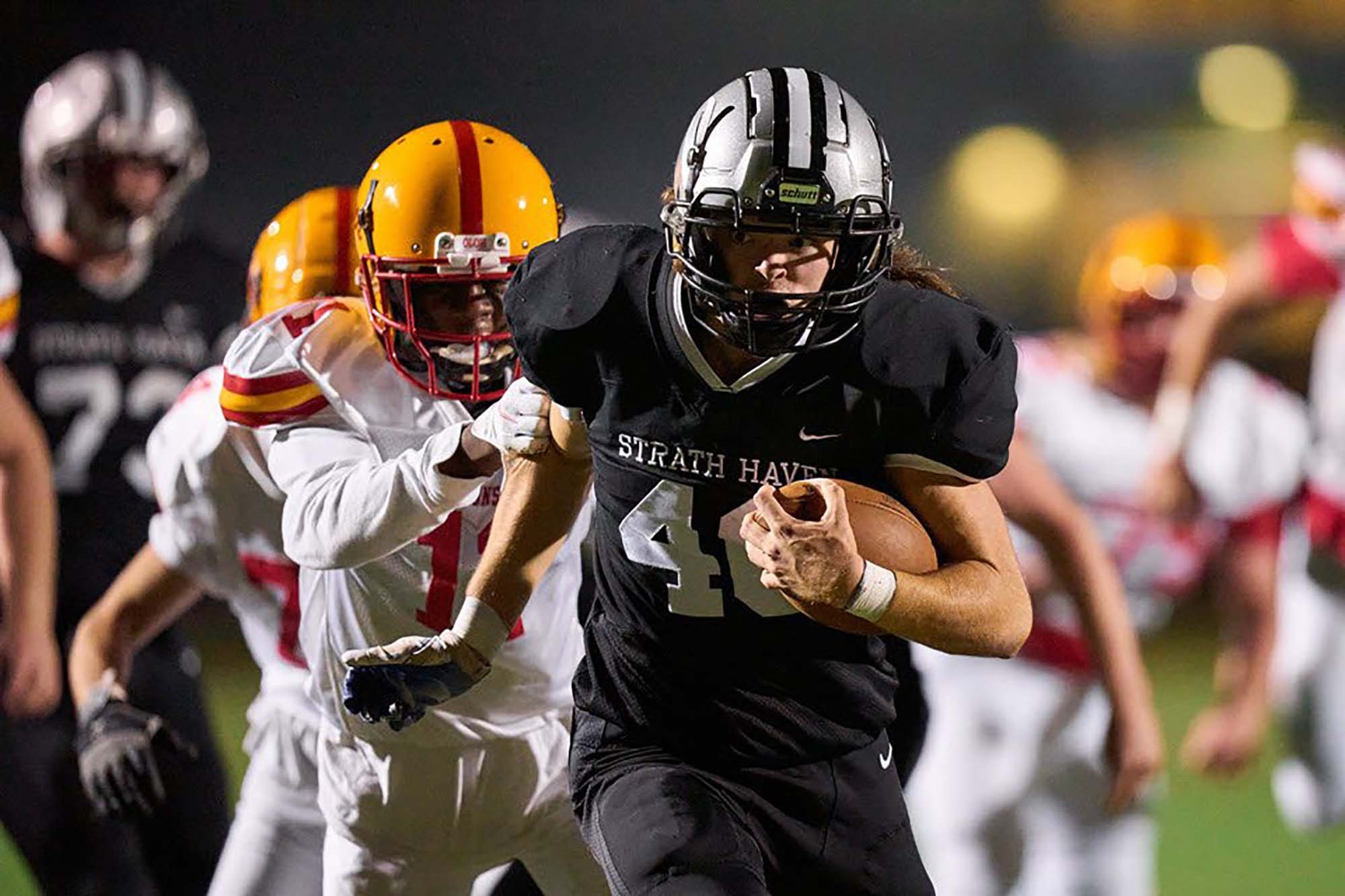Music. Tradition. Citizenship. Fun. A Conversation with SHHS Music Director Nick Pignataro
Nick Pignataro, music director at Strath Haven High School, with the Marching Band
As the head of the Performing Arts department at Strath Haven High School, music director Nick Pignataro wears many hats. Swarthmorean contributor John Hurst recently sat down with Nick to learn more about his history with, and philosophy for, the program.
Nick Pignataro
John: First of all, congratulations on a very successful Marching Band season and Showcase. This must have been a challenging year.
Nick: Thanks... It certainly was. I give credit and gratitude to all the students and staff for making the most out of a difficult situation, and going the extra mile to make it work.
John: I see from your bio at wssd.org that you started as a trumpet player, then trained as a conductor and music educator. Can you give me a little further insight into your teaching philosophy?
Nick: I think the goal of music education is not only to make the students better musicians, but better citizens. Being a successful part of a music ensemble requires both self-discipline and the ability to work with your peers to achieve a common goal. I try to instill that in every student and at every rehearsal. But above all else, it has to be FUN. Music is something that should bring joy to everyone playing and everyone listening, something that is much greater than the sum of its parts.
John: What brought you to Strath Haven? How does it compare to other music programs in which you’ve been involved? Is there anything unique about the program that gained your interest?
Nick: Strath Haven is the dream job. Truly, I plan to spend my full career at Haven because the students are so interested in high-level music making and its nuances. They’re thoughtful, kind, and willing to come along with me on some deep-dive music. I have a passion for ensembles. Conducting the orchestra is a highlight and I just love the community our bands build for students.
John: Jack Hontz was a fixture here for more than 30 years and left a lasting legacy. Have you felt any pressure or obligation to run things his way or live up to his reputation? How do you feel the program has evolved since you arrived?
Nick: I was blown away by this program in 2011 when I was a student teacher with Mr Hontz. Students played at an incredible level even though the sheer number of them was overwhelming. Watching Jack work was the single most formative bit of my music teacher education. I won’t forget how, though he was incredibly busy, he stopped whatever he was doing to look a person in the eye to ask them how they were. I dreamed of finding my own Strath Haven and talking to him about it once I had found it.
Jack’s death continues to bother me because I just miss him a lot. I sense immense pressure to run this program like he did because his work is legendary. I’m no legend and I suspect I never will be. I just have a different way than Jack and his way doesn’t always work for me. I don’t have the same voice, I’m admittedly not as selfless, and I’m certainly not as patient. My first few years here have been emotional for the students because they all seemed to have different expectations of what the band and orchestra teacher should do and be. I felt a lot of negative pressure in my first years and, for the first time in my career, felt misunderstood. I was surprised that my best and most genuine efforts to lead the program did not instill confidence from all members of the community. Some of that is just a fact of life in a pretty public position like this one. A lot seemed to come from what I didn’t know about the community at the time: it was deeply heartbroken.
The band and orchestra community was still suffering from Jack’s death. It didn’t help that I was the third director at Haven in three years, and I felt I had to address that damage first before I could really be myself. The other tangible thing: there are 325 marching band members this year, not the 400 Jack had. That weighs on me. Yet, I have to remind myself that the big number of students is nice but really the band only has one student in it. That’s the student who’s in front of me at the moment I am teaching. Every person needs that attention.
John: Covid-19 wreaked havoc on academic and social structures everywhere, but it must have been especially hard on Performing Arts. How have you and the program adapted and evolved to meet this challenge?
Nick: The Performing Arts were the first things to stop when the pandemic began and they will most likely be the last thing to return. It just seems that’s the surface value society places on the Arts. I’m grateful to have pro sports back and certainly enjoyed the Sixers Florida bubble, as strange as it was. But it’s terribly unequal that The Philadelphia Orchestra is only now returning to the Kimmel Center. In the pandemic’s depths we used the arts to emotionally survive: streaming services, online concerts, etc. We did that at Haven, but it’s still the last thing to return properly. Athletic contests were altered but continued. Concerts were shut down. We had to revolutionize the program to include asynchronous and synchronous online sessions, audience-less outdoor rehearsals, and specialized instrument masks and bell covers. I was able to maintain music as an important part of Haven culture, but I must do a better job of recognizing its worth. Nothing is better than music education and music education is better than nothing. It is critically important that we find ways to bring performances back safely.
John: Since Strath Haven is a non-competitive program, you’re dealing with a much larger group of students than many other people in your position. How does this compare to your previous experience? What challenges has it created, and also what opportunities?
Nick: Nothing prepares you to teach at Strath Haven. Literally nothing. The Panther Band performs annually at the Penncrest Festival of Bands with about 10 other local high schools. It’s a yearly reminder that this place is just different. My biggest issue is logistics. I just don’t have enough staff, space, time, or resources to make everything work perfectly. But perfect isn’t the goal...building citizens is. So, we work for that since we have literally hundreds of people who are committed to exploring goodness and making music together. Still, it’s difficult to address details because of the student-teacher ratio. We lean on student leaders to help, which does add pressure on them, but it also provides leadership training few other high schools can offer. My time at Pennell and Parkside elementary schools, though, did prepare me for the concept of inclusivity. I remembered my student teaching time with Jack and tried to make elementary band available for everyone!
John: We loved hearing Elton John and ELO! What is your process for selecting repertoire for the band? How do you involve the student leadership in these decisions and other things affecting the program?
Nick: The students weigh in on the band repertoire and they have a say in their curriculum. Typically I poll the students for options or even create a class assignment asking them to create a sample halftime show. I use their suggestions to plan the curriculum so long as the suggestions allow students to learn the musical concepts high schoolers should know.
John: Are there other high school or college music programs you admire or emulate?
Nick: I definitely envision an SHHS Marching Band that resembles big college traditions. The Temple University Diamond Marching Band appears to have the most fun and be the most hip of any band I’ve seen. So much of what they do can work at Haven. We focus on precision marching and playing, making cool drill pictures on the field, and having a ton of fun playing in the stands to support the team.
John: What is on your to-do list for SHHS Music? How do you envision the program evolving 3 years, 5 years, 10 years in the future? How will it maintain traditions going forward?
Nick: The program is now moving closer to my vision for it. My five-year plan has shifted with 1.5 years of online learning due to the pandemic, but things are on the move. The program must continue growth in a few ways: check in on the social and emotional welfare of every student, regardless of their musical achievement, fix and maintain the facilities and equipment, develop an identity that works well in the 21st century, and prepare to streamline processes to make this program fun for decades. We’re continuing the traditions that have made this such a great program: inclusivity, crossing the bridge, and wearing JH12 logos on our uniforms to honor Jack, to name a few. The most important tradition I require now is for our band to be the kindest in the land. Haven students must realize that all people are different and our band must go out of our way to treat other bands and schools with support. It’s got to be us! We’ve also clarified the roles of each Marching Band student leader to empower them a bit more. I realized after Year One that I just can’t do everything! Having students own specific tasks has made the band stronger. Check out the final number of each show, too. You’ll see our students dance on the field. Dancing is a sign of celebration and letting students simply enjoy being together. Wherever we go, we dance! In a few years I expect the playing, dancing, and marching level to grow with students being really comfortable embracing a fun style and atmosphere. Student leadership will continue to own the band’s growth and put their personal touches on it. I tell them that it is their band because it is their band, and the more they believe it the more it will become true.





